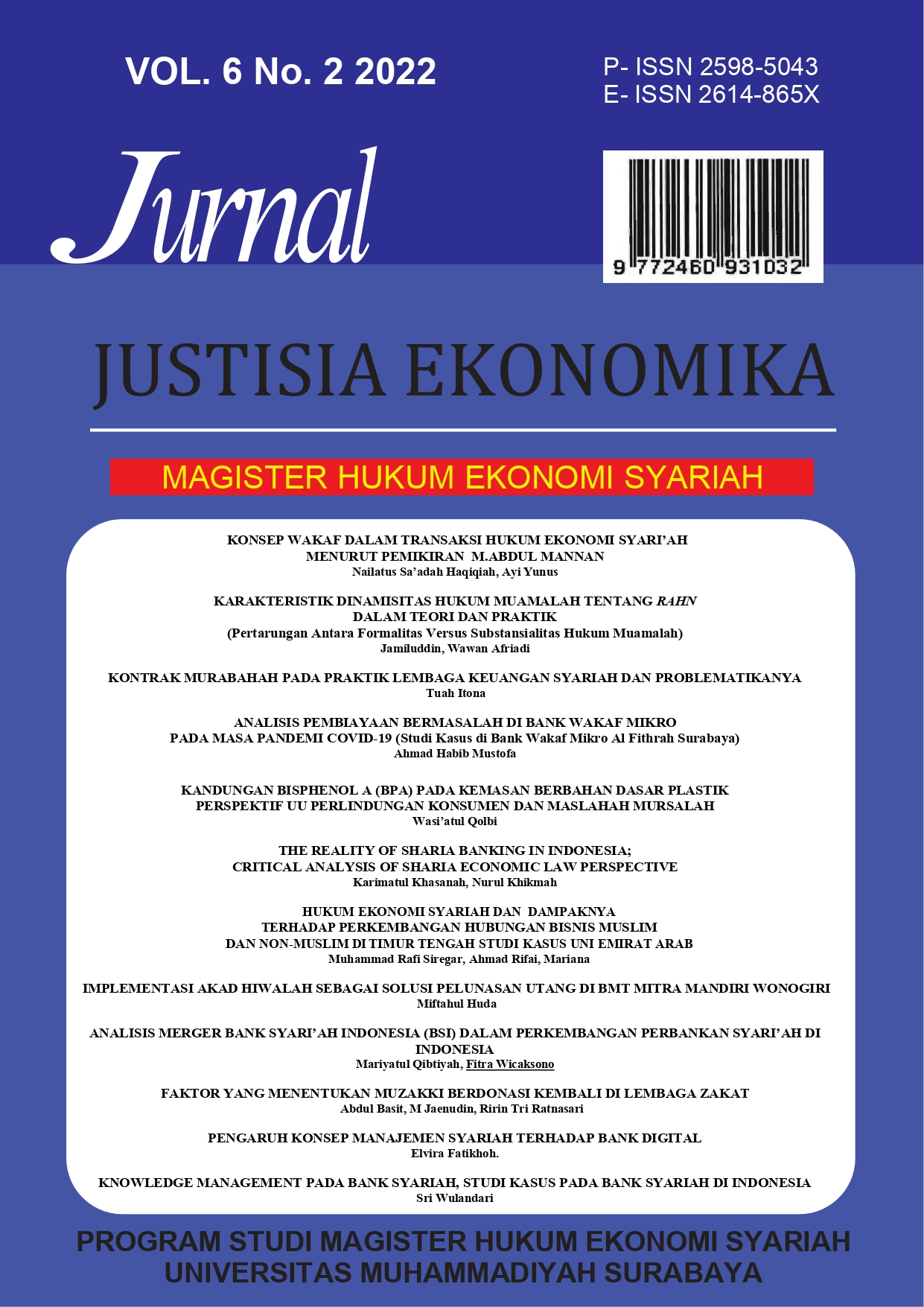IMPLEMENTASI AKAD HIWALAH SEBAGAI SOLUSI PELUNASAN UTANG DI BMT MITRA MANDIRI WONOGIRI
DOI:
https://doi.org/10.30651/justeko.v6i2.15160Abstract
The birth of a sharia-based economic system should be a solution to various economic difficulties of the community. But, many of default cases that led to the settlement in Wonogiri Religious Court seemed to show that the principles of Sharia Economic Law were not seen in hiwalah agreement at BMT Mitra Mandiri. Based on that, this research was limited to answer the following problems : (1) How is the implementation of the hiwalah agreement at BMT Mitra Mandiri Wonogiri? (2) What are the problems that often arise from the implementation of hiwalah agreement at BMT Mitra Mandiri Wonogiri? (3) How is the implementation of the hiwalah agreement at BMT Mitra Mandiri Wonogiri in accordance to Sharia Economic Law? The research data can be collected at BMT Mitra Mandiri Wonogiri, thus this research can be categorized as a Field Research. The results of this research are : (1) BMT Mitra Mandiri Wonogiri set the terms and condition as stated in the Sharia Economic Law. They used hiwalah bil ujroh agreement that performed by saying ijab and qabul, pronounced clearly without any coercion. The object of the agreement was not forbidden by sharia. (2) Â The problem that often arise was the customers did not fulfill their obligations. It was caused by uncertain economic conditions and the customers who like to delay payments. (3) the implementation of hiwalah financing was in accordance to Sharia Economic Law and the principles of tawhid, justice, maslahah, ta'awun, and caliphate.
References
REFERENSI
Abdul Aziz Dahlan, “Ensiklopedi Hukum Islamâ€, (Jakarta: Ichtiar Baru Van Hoeve. 1996), 399.
Fathurrahman Djamil, “Hukum Ekonomi Islamâ€, (Jakarta: Sinar Grafika. 2015), 154.
Ibnu Nujaim. “Al-Asybah wa al-Nadha’ir ‘ala Mazhabi Abi Hanifah al-Nu’man.†(Beirut: Dar al-Kutub al-Alamiyah, t.th), 100.
Jalaluddin al-Suyuthi. “Al-Asybah wa al-Nadha’ir fi qawa’id wa furu’ fiqh al-Syafi’iyah.†(Beirut: Dar al-Kutub al-Alamiyah, t.th), 60
Kompilasi Hukum Ekonomi Syariah
Muhammad Sharif Coudry, “Sistem Ekonomi Islamâ€, (Jakarta: Kencana, 2012), 60.
Neneng Nurhasanah, “Hukum Perbankan Syariah: Konsep dan Regulasiâ€, (Jakarta: Sinar Grafika, 2017), 302-303.
Nurul Huda, Dalam Keuangan Publik Islami; Pendekatan Teoritis dan Sejarah, (Jakarta: Kencana, 2012), 239.
Redaksi OCBC NISP, “Apa Itu Wanprestasi? Ini Pengertian, Unsur, & Dampak Hukumâ€, OCBC NISP, https://www.ocbcnisp.com/id/article/2021/08/12/wanprestasi-adalah, 2021
Redaksi OCBC NISP, “Hiwalah: Pengertian, Skema, Dasar Hukum, Jenis, & Contohnyaâ€, OCBC NISP, https://www.ocbcnisp.com/en/article/2021/07/15/hiwalah-adalah, 2021
Sri Nurhayati, “Akuntansi Syariah di Indonesia†(Jakarta: Salemba Empat, 2011), 260.
Downloads
Published
How to Cite
Issue
Section
License
HAK CIPTA
Penulis yang mengirimkan artikel dalam jurnal Justisia Ekonomika harus memahami dan menyetujui persyaratan tentang hak cipta jurnal Justisia Ekonomika sebagai berikut:
1. Hak Cipta tulisan / artikel yang diterbitkan di jurnal Justisia Ekonomika otomatis menjadi hak pengelola jurnal atau publisher
2. Meskipun Hak Cipta atas tulisan yang telah diterbitkan di jurnal Justisia Ekonomika adalah menjadi haknya publisher, tetapi penulis masih mempunyai hak untuk : a). Penulis boleh meng-upload di repository kampus, b). Penulis boleh meng-upload di webnya sendiri, c). Penulis boleh meng-upload di google schoolar, orchid dan sinta
LISENSI
Lisensi atas tulisan / artikel yang diterbitkan di jurnal Justisia Ekonomika adalah menggunakan Creative Commons dengan atribusi CC-BY-NC 4.0






















